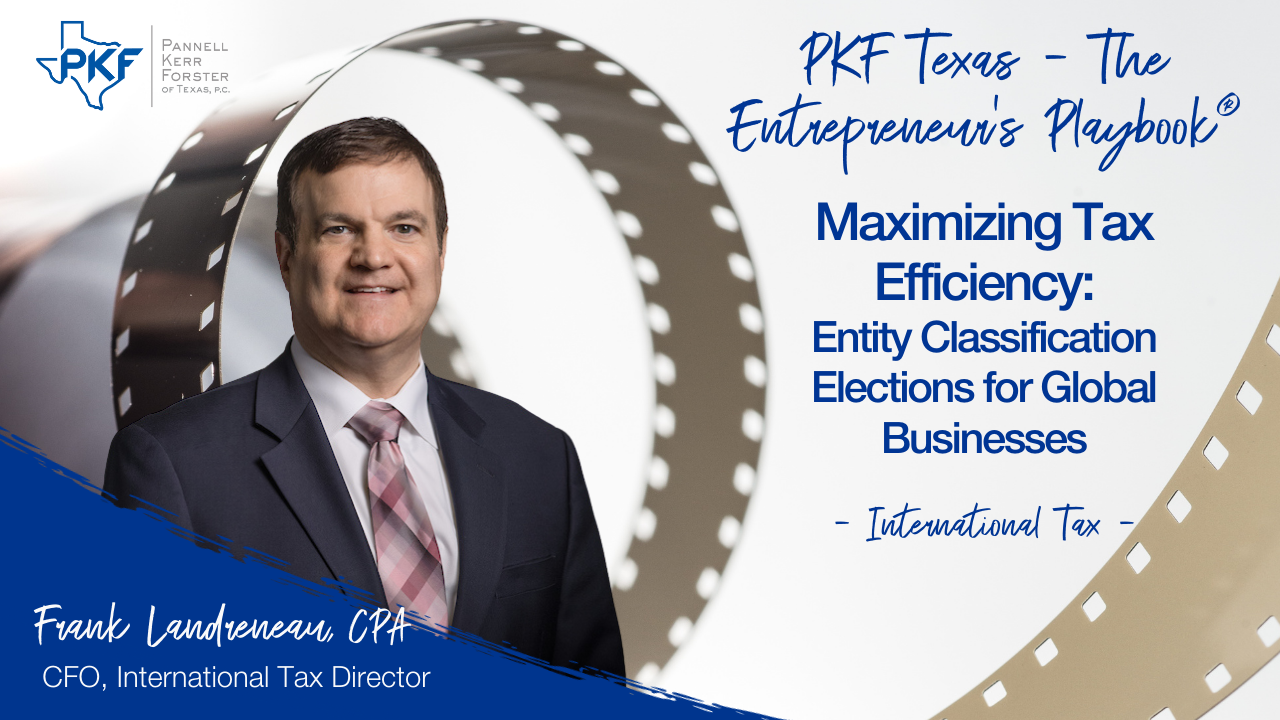Maximizing Tax Efficiency: Entity Classification Elections for Global Businesses

Jen: This is the PKF Texas Entrepreneur’s Playbook, I’m Jen Lemanski, and I’m back once again with Frank Landreneau one of the Approachable Advisors® and a leader of our international tax practice. Frank, welcome back to the Playbook.
Frank: Thanks for having me again.
Jen: In our last few videos, we talked about different elections people can make, and you talked about some entity classification elections. What are those and what should people consider? And I know we talked about modeling as well, and how does that play into all the things?
Frank: It’s a really good tool because into the classification election brought clarity to how you’d be treated for US tax purposes, whether you’d be taxed as a corporation or something other than a corporation it’s been around for quite a while, since 1997. And so, it’s also a very useful tool in international planning and it kind of plays into a another tool we can use to help individual owners, which is really who owns middle market businesses either through pass through entities like partnerships, S Corporations that have foreign operations that previously the tax reform may have structured themselves in the form of a control foreign corporation. And now they want to do something different because now they have the GILTI income pact, which we talked about in the previous segments.
One of the things we can do, although it comes at a tax cost, is to make an election to treat the corporation as a disregarded entity. And in that way you can avoid some of the nasty aspects of GILTI, you’re not denied the foreign tax credit, for example. You can incur losses and have those deducted against US source income for US tax purposes. And it creates a lot of different opportunities. The problem is, is that historically for foreign corporations that are actually formed by US companies as opposed to, let’s say one that they purchased as an acquisition have a relatively low tax basis. And over time as they’ve grown the business, the value has gone up in value. So, if you make a check … election to treat the entity as a foreign branch as opposed to corporation then you could incur a pretty high long-term capital gains tax. So, that’s, that could prevent someone from doing this kind of planning. But sometimes particularly during economically depressed periods, you can kind of take a look at it, especially if you have other tax attributes that are offsetting like net operating loss carry forwards, you can actually offset the cost. So, you really kind of have to go through different scenarios to see what might be the right thing for you.
Jen: And what happens if in those scenarios the tax cost is just too high? What do you do then?
Frank: Yeah. Then we’re probably looking to go back to some of the options we’ve talked about in earlier segments, like making the GILTI high tax exception election. If that’s appropriate depending on what the results are or the 962 election could be beneficial depending on what jurisdictions you’re operating in. But one thing you could actually do is just kind of let the existing company bleed out. You know, in other words, form a new entity that is a disregarded entity for us tax purposes. And just let the old company just unwind and let the business die off. And let the new business would be start up and have that in the new structure and so forth. Now, realizing I know that’s not always easy especially if you have contracts and licenses and some other commercial things that may not be easily transferrable from one entity to the next, that could be difficult. But that’s, that’s always another option to do. It’s really, it’s kind like starting over in a matter of speaking.
Jen: Yeah. Kind of get that fresh slate, see what makes sense. And again, I think that modeling comes in right, to see what all your different options are?
Frank: Absolutely. You got to really look at each one and say, okay, what is the, the best option for you. And of course, timing also makes a difference. A lot of times people looking to sell their business. So, what is your time horizon to what is your exit strategy? Do you have one.
Jen: Yeah. Is it two years from now or is it 10 years from now, because that’ll play a big factor.
Frank: Absolutely. Yeah.
Jen: Perfect. Well, we’ll get you back to talk a little bit more about that. Sound good?
Frank: Sounds great. Thank you.
Jen: This has been another Thought Leader production, brought to you by PKF – Texas the Entrepreneur’s Playbook. For more information about this and other topics, visit pkftexas.com/insights. Tune in next week for another chapter.

